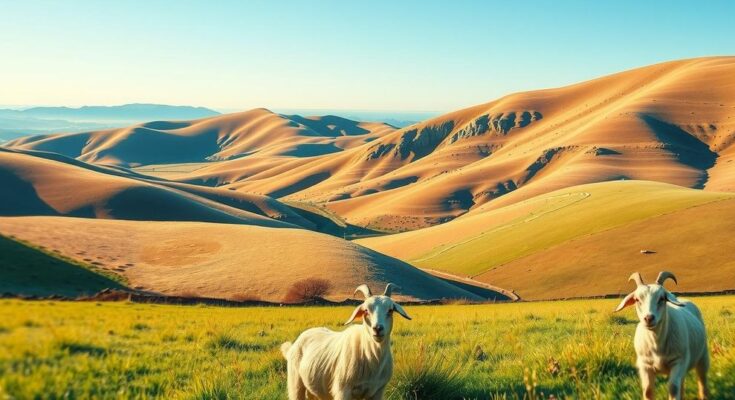In Ovalle, Chile, women goat herders are innovating to combat climate change by improving cheese quality and variety. Despite prolonged droughts significantly affecting water supply and pasture growth, they have adapted their herding practices. Their international achievements in cheese competitions and focus on sustainable practices reflect their commitment to preserving cultural heritage and addressing climate challenges.
In Ovalle, Chile, women goat herders are adapting their traditional practices to confront the challenges posed by climate change, particularly prolonged drought conditions. Since the goat herding tradition began in 1544, these women have taken significant steps to improve the quality and variety of their cheeses, leading to international recognition and awards for their products. Despite facing severe drought, which has diminished water supplies and affected pasture growth, they remain resilient and innovative in their approach to herding.
In 2024, the municipal region of Ovalle received only 89.2 mm of rainfall, a small amount compared to previous years. The Limarí River reservoir is at just 15% capacity, compelling herders to make adjustments, including raising goats in stables or semi-stabled systems while still allowing them access to pastures. This adaptation, while necessary, has raised concerns about the reduction in milk production from confined animals. Yasna Molina, an award-winning cheese maker, emphasizes the importance of her goats’ health in producing quality cheese.
The region is home to approximately 5,391 goat cheese producers, with 80% of them being small herders, more than half of whom are women. The climate crisis has forced many to migrate to higher altitudes in search of better grazing conditions. Manuel Portilla, a herder displaced by drought, describes the challenging journey he undertook to relocate his goats, highlighting the risks posed by extreme weather.
Agronomist Claudia Torres notes that small-scale herders are disproportionately affected by climate change since many lack adequate resources to feed their herds due to the historical practice of seasonal grazing. As water scarcity intensifies, it poses a serious obstacle for herders, further complicating the dynamics of goat farming in the region. Torres calls for immediate policy interventions in managing water resources to assist these vulnerable producers.
Molina’s success at international cheese competitions has inspired other herders to embrace innovative agricultural practices while also fostering a sense of pride in their heritage. Female herders like Elsa Araya and Juana Pérez Milla have also made strides to increase efficiency and expand their cheese offerings, employing different cheese flavors and investing in irrigation systems to counter water shortages effectively.
Chilean goat herding boasts a rich history intertwined with cheese production, which is now garnering renewed interest in global markets due to its health benefits. Goat cheese is valued for its lower fat content and increased nutritional value compared to other types of cheese. The global market for goat milk is projected to grow substantially in the coming years. As these women work to enhance their products, they are also focusing on achieving designations of origin that recognize the unique qualities of their cheeses while ensuring the protection of the Criollo goat breed.
In summary, the award-winning women goat herders in Ovalle, Chile, exemplify resilience in the face of climate change. By adapting their traditional practices and emphasizing the quality of their products, they continue to thrive despite challenging environmental conditions. Their commitment to innovation, coupled with a rich cultural heritage, positions them favorably in the growing global market for goat cheese. Efforts to secure designations of origin could further enhance their livelihoods while preserving their invaluable traditions.
Original Source: www.globalissues.org




